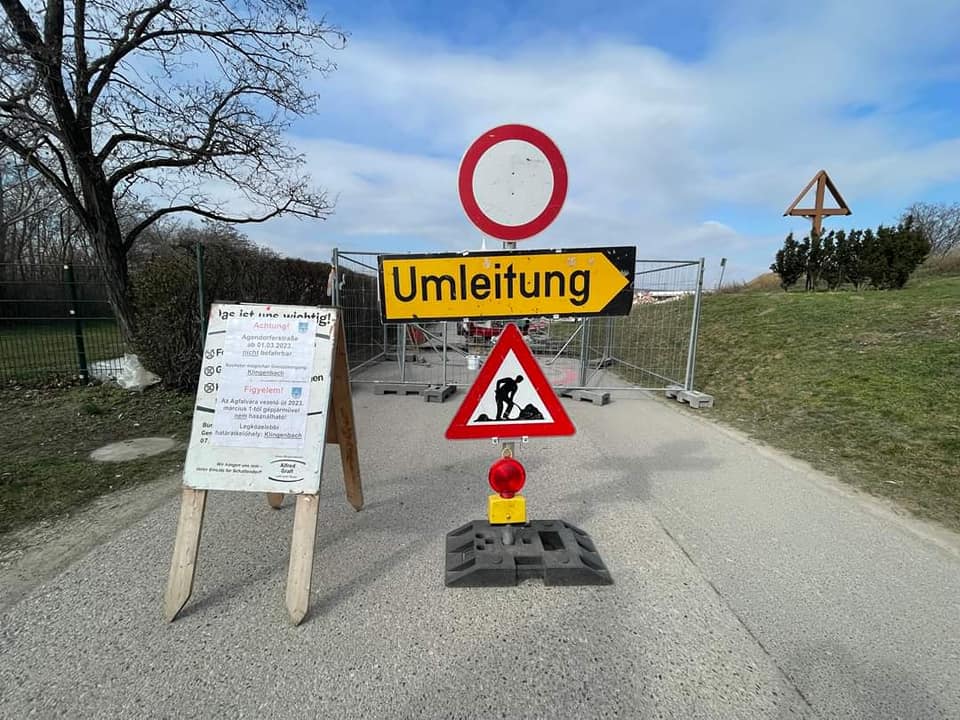
According to Péter Szijjártó, it needs to be ensured that the possibility of rapid crossing at as many points as possible is provided without dramatically worsening the living conditions of local communities.Continue reading
The conflict over the border crossing between Schattendorf (Somfalva) and Ágfalva (Agendorf) is not subsiding. While the mayor of Schattendorf, Thomas Hoffmann (SPÖ), together with the mayor of Ágfalva, Zsuzsanna Pék, and lawyer Johannes Zink, presented their final plans for the border crossing between the two settlements at a press conference in the Schattendorf municipal office on Tuesday, more than 30 demonstrators arrived on the Hungarian side of the border, as details of the new arrangement had already become known, ORF reports.
The border crossing between Schattendorf and Ágfalva had been closed on March 1 due to construction work. As it now turned out, lowering posts to ease traffic were installed at the border crossing, costing the municipality about 110,000 euros.
According to Schattendorf’s mayor, Thomas Hoffmann,
the border crossing, closed since March, will be reopened starting July 3. However, a permit is required to pass through.
The permit will cost 160 euros, of which about 140 euros will be reimbursed in the form of vouchers that can be redeemed in Schattendorf. All this between two countries of the Schengen area within the European Union, whose basic principles include the mobility of people and workers.
The mayor of the Austrian municipality justified the measure with the need to ensure the safety of local residents, as there have been serious traffic accidents in the area in the past, and there is no economic interest in safety. He stressed that the border would not be closed and anyone with the necessary permits would be able to use it freely, adding that the time limit on crossing the border, also an issue in the past, would be lifted. The mayor had previously written on his social media page that the measure was not in conflict of interest with the open borders rule in the European Union.
Regarding the permit, Hoffmann said that
if the municipality of Schattendorf approves the application, motorists will receive a sticker to be placed on the windshield of their car, to be automatically recognized by the border system, ensuring passage.
Anyone who misuses their sticker in any way will have their permit revoked and will not be able to apply for it in the future, he added.
Processing of the permit takes up to two weeks and according to ORF, requires not only personal documents but also evidence of eligibility showing, among other things, that the border crossing is either for overriding personal interest or personal economic interest. A “panel of experts” will decide on the applications received.
The measure is unprecedented in the EU and raises serious legal questions.
The question of whether a small town can control a country’s border crossing point, and whether it has the authority to decide who can and cannot cross the border, is unavoidable in the context of the measure, not to mention the concerns of casual travelers.
During the press conference, more than 30 demonstrators, commuters, pensioners, and also Austrian sympathizers arrived on the Hungarian side of the border, as details of the new arrangement had already become known. With banners they drew attention to the rights of EU citizens and the rules of the Schengen area.
After the press conference, the mayor of Ágfalva, Zsuzsanna Pék, presented the details of the final settlement to those gathered on the Hungarian side, while Mayor Hoffmann did not appear on the Hungarian side.
After the mayor’s presentation, a heated debate ensued. Pék was also not enthusiastic about the solution. In her opinion, it would be ideal to build more roads in the area, where traffic and border crossing are increasing, reports ORF.
Ungarn Heute has contacted the Hungarian Ministry of Foreign Affairs on the matter, but had not received a response by the time this article was published.
Via Ungarn Heute, Contributed image: Facebook/ORF Magyarok